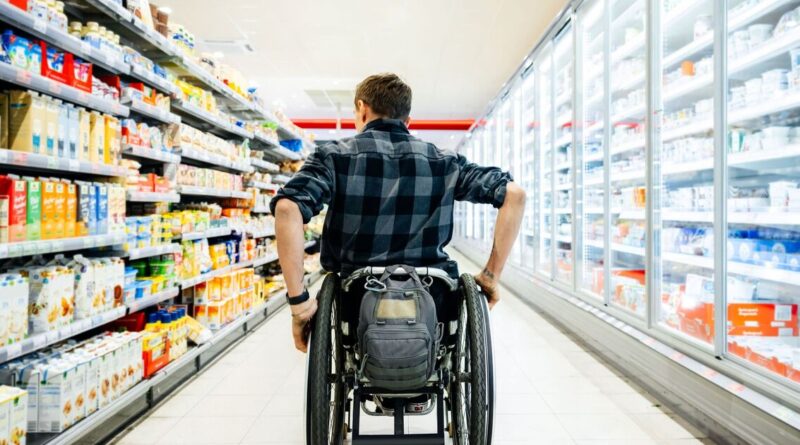PIP: ‘Hidden costs’ of living with a disability now amounts to £975 a month | Personal Finance | Finance
Disabled households need an extra £975 a month to have the same standard of living as non-disabled, new research shows.
This figure, estimated by disability charity Scope, amounts to nearly £12,000 a year and comes despite having access to disability benefits, such as Personal Independence Payment (PIP).
Disability advocates argue that subsequently, the Government’s recent proposal to overhaul the PIP benefits system could see the most vulnerable members of society struggle financially, mentally, and physically.
Amelia Peckham, disability advocate and co-founder of Cool Crutches and Walking Sticks said: “Disabled people often require additional equipment and adaptations to support their daily lives.
“In my experience, I suffer from a lack of circulation as a result of nerve damage and so rely on heating and hot baths to maintain comfort and functionality. This has a huge impact on bills – hot water bottles, electric blankets, heating, it all adds up.”
A recent Government survey showed disabled individuals are more likely to struggle with energy bills, with over half (55 percent) finding it difficult to afford them and seven percent being behind on payments.
In comparison, two in five (40 percent) and four percent of non-disabled people face similar difficulties.
Almost half (45 percent) of disabled adults have also found it difficult to afford their rent or mortgage payments compared with two in five (37 percent) non-disabled adults.
Additionally, almost one in 10 disabled adults reported that, in the past two weeks, they had run out of food and could not afford to buy more, compared with just three percent of non-disabled adults.
Ms Peckham said: “Similarly, a range of mobility equipment is often needed and small maintenance, replacement parts etc. need to be considered Anything from needing two crutches on a bad day to switching between no mobility aid, a walking stick, crutches, a wheelchair and a power chair means the amount of kit we need to ensure we can move on any given day is huge.
“All too often these costs are little but frequent and they add up. We also know disabled people earn less, struggle to find work and often are unable to work full-time.
“This pushes the cost onto a lower-income household and increases the time spent at home versus an office which then costs to keep warm, comfortable and mobile are significant when income isn’t.”
While it’s illegal for insurance providers to charge disabled drivers more for car insurance, cars can cost more to insure if it is modified to allow disabled drivers to drive safely and comfortably. According to Ms Pekcham, this means disabled drivers can experience higher premiums.
Accessibility causes the most concern, with almost one in three disabled people saying they don’t make some journeys due to transport challenges.
Ms Peckham said: “Transport with a disability is a minefield. London for example, has a handful of tube stations that are accessible and step-free.
“This means the vast majority can’t be used by someone with a mobility-related disability. This leaves buses and taxis but again, buses often aren’t an option due to timings and so taxis become essential which is a very expensive way to travel.”
Ms Peckham shared a rundown of her journey last week, comparing what it would have cost with and without a disability.
Without a disability, Ms Peckham said a day return train ticket from Harrogate to London with the ability to change would cost £104, with a return tube ticket (£5.40) and a short walk would have totalled £109.40.
With a disability, Ms Peckham said she had to get an overnight return train ticket from Harrogate to London direct with disabled railcard for £96.90 with a return taxi to a hotel (£53.60). Additionally, she had to book a hotel stay at £194.25, which overall, totalled £344.75.
Ms Peckham shared a few “hidden costs” of living with a disability from her experience, which include:
- Time and money spent on treatment, appointments, and medications and then attending, managing, ordering, collecting and taking them.
- Time spent doing what you want without needing to plan, such as catching a bus/train/plane without planning or thinking. Meeting friends without checking access, parking and bathroom setups.
- Tubes and buses don’t have toilet facilities, meaning taxis are usually the only solution for quick access.
- Going to the theatre, cinema, concert or festival and arriving when it starts/leaving when it ends instead of having to get there early/wait until everyone else has left.
- Equipment to support fluctuating symptoms – some days a single stick, sometimes a crutch/crutches/wheelchair/car.
Ms Peckham added: “There is almost no room for spontaneity with a disability because going for it will invariably result in a surprise that is inaccessible and causes more harm than good.
“It’s really difficult to quantify the actual cost of living with a disability but given the rise in inflation and cost of living, it is highly unlikely the cost of living with a disability is as low as £975.”




